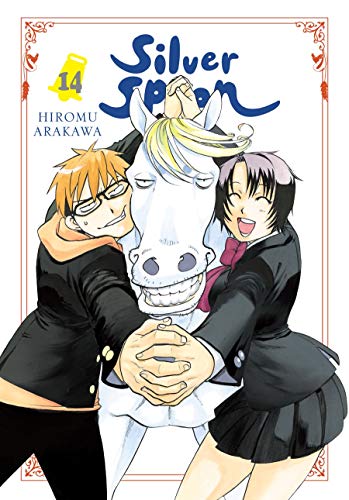By Hiromu Arakawa. Released in Japan as “Gin no Saji” by Shogakukan, serialized in the magazine Weekly Shonen Sunday. Released in North America by Yen Press. Translated by Amanda Haley.
It took a long time for Silver Spoon to draw to a close in the pages of Weekly Shonen Sunday. Chapters would come out 2 or 3 at a time and then the series would go on hiatus for another 6 months. Rumor had it that the author was dealing with personal issues (and she was also drawing The Heroic Legend of Arslan at the same time). That said, the announcement that the series would be ending came as a surprise to fans, who found the ending a bit rushed. Thankfully, it reads better in volume form, and it’s a good ending, although having paired up Hachiken and Mikage at last Arakawa is prepared to lean back on making fun of them, which she’s far more comfortable with – by the final chapter the two still aren’t married, even while others from the series have children already. Still, it was never really about the romance, it was about the farming, and there’s plenty of that here.
This assumes, of course, that Hachiken can pass his exams. As always with him, it’s not his actual intelligence that’s the issue but his hideous luck, which is even worse than usual – he’s hit by a car and breaks his leg, and the exams are in the deep snow. Fortunately, he does indeed pass and everyone gets to graduate, with several pages of the main cast spouting off where they’re headed next, ranging from college (Hachiken, Mikage) to taking over the family farms (most of the others) to unemployed, as Yoshino was not able to hook up a cheese-related job that wasn’t suspicious by graduation, so is simply moving to France for a while. We then flash forward a few years, showing everyone’s futures, and see Hachiken heading into Russia for his business, where he’ll be working with a very familiar face…
I enjoyed the fact that Komaba appears at the end here, and is still interested in baseball. His arc was so important for the development of Hachiken and Mikage, and also served to reinforce the idea that financial success in a business like farming is not remotely guaranteed. The other fates of the character range from amusing (Yoshino’s French boyfriend, Tokiwa being married with a kid) to a sort of happy stasis (Hachiken and Mikage, who want to wait till he has financial stability till they get married, so have essentially stayed exactly the same). And Hachiken’s future is also in pigs, and farms, and Silver Spoon, in the end, has been about modern farming and the ways to keep it going even as technology, economic crises, and other problems make the job of “farmer” more of an anachronism. I think Hachiken will make it eventually… though he’d better factor is luck into their business plan somewhere.
At last all of Silver Spoon is out in English, after years of me begging Viz to license it. It ended up with Yen Press instead, who did a good job with it – my constant tweets of “why is this not licensed – right, it’s a farming manga” proved wrong but also right. It has been licensed. And it’s an amazing farming manga.














